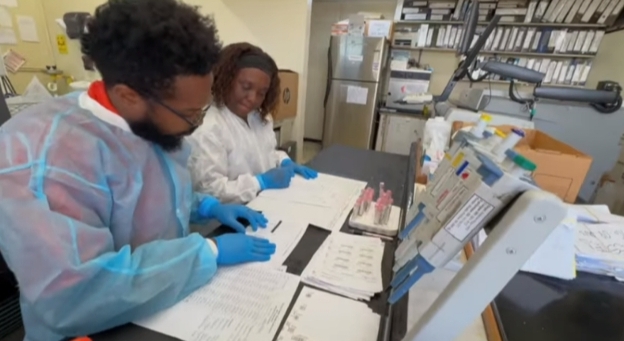Belize, Jamaica, and St. Vincent and the Grenadines are the latest countries in the Americas to receive certification from the World Health Organization (WHO) for eliminating the mother-to-child transmission of HIV and syphilis (EMTCT). The milestone was marked today at a commemorative event organized by the Pan American Health Organization (PAHO) in Kingston, Jamaica, with support from UNICEF and UNAIDS and with the participation of health ministers from the three countries.
“This achievement is a testament to years of dedication, hard work, and collaboration among governments, health professionals, and communities”, PAHO Director Dr. Jarbas Barbosa said at the event. Dr. Barbosa also acknowledged the “remarkable resilience” displayed by the three countries, ensuring the adaptation and continuation of essential services despite the challenges posed by the COVID-19 pandemic. “I trust that the celebration today will inspire other countries to reinvigorate their commitments” towards a generation free of HIV and congenital syphilis.
In 2010, countries of the Americas committed to the elimination of mother-to-child transmission of HIV and syphilis and endorsed the regional strategy, which was updated in 2016 under the PAHO Plan of Action for the Prevention and Control of HIV and Sexually Transmitted Infections.
To meet elimination targets, countries focused on strengthening prevention and treatment services within primary health care and in maternal and child health, updating guidelines, ensuring the effective screening of pregnant women, monitoring cases and following-up with HIV and syphilis exposed infants.
In a video message, WHO Director-General Dr. Tedros Adhanom Ghebreyesus, praised Belize for integrating primary disease prevention and treatment into maternal and child health services. He also commended Jamaica for its civil society organizations’ commitment to human rights and lauded St. Vincent and the Grenadines for investing in robust national laboratory structures. “While validation is a tremendous accomplishment, maintaining it requires sustained efforts to prevent new infections,” he said. “WHO and partners will continue to support all countries in the Americas to strengthen health systems, provide comprehensive services, and ensure the involvement of women in planning and service delivery.”
Globally, 19 countries and territories have now been certified for eliminating mother-to-child transmission of HIV and/or syphilis, with 11 of them located in the Americas. In 2015, Cuba made history by becoming the first country in the world to achieve the dual elimination of HIV and syphilis. This was followed by Anguilla, Antigua and Barbuda, Bermuda, Cayman Islands and Montserrat and St. Kitts and Nevis in 2017, and Dominica in 2020.
“The end of AIDS is an opportunity for a uniquely powerful legacy for today’s leaders. We are again celebrating a great public health milestone today as Caribbean countries show global leadership in the elimination agenda to achieve an HIV free generation,” Christine Stegling, UNAIDS Deputy Executive Director, said.
New HIV infections among children in the Caribbean decreased by 25% between 2010 and 2022. During that period, annual notified cases declined from 2,000 to 1,500. Reported cases of congenital syphilis in the English-speaking Caribbean now stand at 36 cases per 100,000 newborns, below the goal of no more than 50 cases per 100,000 newborns.
“UNICEF welcomes the commitment of Belize, Jamaica and Saint Vincent and the Grenadines for achieving the double elimination of vertical transmission for HIV and Syphilis”, Garry Conille, UNICEF Regional Director for Latin America and the Caribbean, said. “We are confident that this milestone will be a catalyst for other countries in the region to pursue the Elimination of Mother-to-Child Transmission Agenda toward the 2030 target: No child left behind in the progress to end AIDS,” Conille added.
WHO awards this certification to countries which have brought the mother-to-child HIV transmission rate to under 5%; provided antenatal care and antiretroviral treatment to more than 90% of pregnant women; reported fewer than 50 new cases of congenital syphilis per 100,000 newborns, and achieved an HIV case rate of fewer than 500 per 100,000 live births.
Elimination Initiative
The PAHO Elimination Initiative seeks to put an end to more than 30 communicable diseases, including the mother-to-child transmission of HIV and syphilis, in Latin America and the Caribbean by 2030.
The initiative was relaunched during the Organization’s 60th Directing Council and seeks to harness the lessons learned from the COVID-19 pandemic, as well as from previous elimination experiences to accelerate disease elimination in the Region.
Quotes from Ministers of Health
Kevin Bernard, Minister of Health and Wellness of Belize: “Eliminating mother to child transmission of HIV and syphilis is an extremely significant accomplishment for the people and the country of Belize. The activities leading up to this momentous goal were not always easy, however with the commitment and motivation of our health care workers, in all areas of health, this has become a reality. We continue to work towards achieving public health goals for a healthier and more productive Belize.”
Dr. Christopher Tufton, Minister of Health and Wellness of Jamaica: “The elimination of mother-to-child transmission of HIV and syphilis is a win that underscores protecting the health of all. It is also exemplary of the extraordinary progress being made in our maternal health care. What’s more, it is vitally important that we consolidate the gains made from this achievement, especially through continued community engagement and partnership in the public health interest of all.”
St. Clair Jimmy Prince, Minister of Health, Wellness and the Environment of St Vincent and the Grenadines: “I commend the dedication and commitment of healthcare workers on achieving certification by the World Health Organization (WHO) of the dual elimination of mother to child transmission (EMTCT) of HIV and syphilis. This achievement signals to the world that ending paediatric HIV and congenital syphilis through the elimination of mother to child transmission of HIV and syphilis is achievable. The Ministry will continue to work towards ending AIDS as a public health threat by 2030.”


 Caribbean News7 days ago
Caribbean News7 days ago
 Caribbean News7 days ago
Caribbean News7 days ago
 Caribbean News1 week ago
Caribbean News1 week ago
 Caribbean News1 week ago
Caribbean News1 week ago
 Bahamas News7 days ago
Bahamas News7 days ago
 News7 days ago
News7 days ago
 Bahamas News1 week ago
Bahamas News1 week ago
 News7 days ago
News7 days ago






















